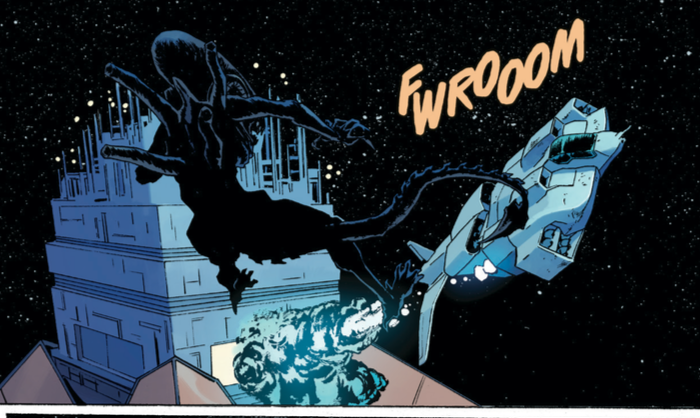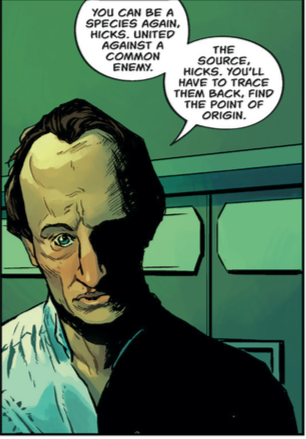Alien 3 has a certain reputation with different groups -- to David Fincher, it was a nightmare first production for the enfant terrible director, one he has since refused to be associated with because the studio will not restore his child autopsy scene, which even the biggest Gone Girl fan in the world would admit is a bit much. For movie dorks, it’s a movie you like to argue is better than whoever is tolerating listening to you remembers. For most people, it’s the one where Sigourney Weaver got head shaved. For losers, it’s the one where Newt dies off-camera and they get angry. I remember Alien 3 as the first rated R movie that had a very large toy push, meaning I was being sold ephemera related to a product I technically wasn’t supposed to see.
For cyberpunk novelist William Gibson, Alien 3 was how he got his WGA card. He says as much in this books--an adaptation of a screenplay that wasn't used--introduction. Gibson’s association with Hollywood has largely been uninteresting. Adaptations of his work that have made it to screen amount to 90s-doing-80s footnotes like Johnny Mnemonic and New Rose Hotel (though he allegedly wrote most of Kathryn Bigelow’s excellent Strange Days without screen credit). For Alien 3, Gibson turned two drafts over to Walter Hill and David Giler that had little to do with the final product. That's a good thing. Gibson’s script has long been available on the internet. It’s not enough of an oddity to be interesting. It’s okay. The comic is ultimately okay too.
 If this comic did not have the prestige of a novelist’s name attached it would have little to distinguish itself from any number of Alien comics Dark Horse released in the 90s (the one series that always stood out to me was the Jim Woodring/Killian Plunkett one, mostly because of how venal it got compared to the usual colonial marines-driven stories). Johnnie Christmas’ adaptation is a faithful one that at times struggles to make conversation-heavy material visually interesting. One could think one of the reasons why Gibson’s script didn’t make it through Hill and Giler’s draconian production process was that their revisions of the first two Aliens scripts had to do the same thing: to take material that would be in other hands rote and make it cinematic. The difference between Dan O’Bannon and Ron Shusett’s ALIEN and Hill/Giler is almost entirely stylistic, but they are a million miles apart in quality.
If this comic did not have the prestige of a novelist’s name attached it would have little to distinguish itself from any number of Alien comics Dark Horse released in the 90s (the one series that always stood out to me was the Jim Woodring/Killian Plunkett one, mostly because of how venal it got compared to the usual colonial marines-driven stories). Johnnie Christmas’ adaptation is a faithful one that at times struggles to make conversation-heavy material visually interesting. One could think one of the reasons why Gibson’s script didn’t make it through Hill and Giler’s draconian production process was that their revisions of the first two Aliens scripts had to do the same thing: to take material that would be in other hands rote and make it cinematic. The difference between Dan O’Bannon and Ron Shusett’s ALIEN and Hill/Giler is almost entirely stylistic, but they are a million miles apart in quality.
 The comic is populated with characters you don’t care about, arguing about the omnipresent company (Gibson himself was influenced by the way Alien and Blade Runner treated corporations as state-like entities). The story has a great thematic heft of keeping the weapons division away from the aliens, and Gibson treats them specifically as a virus, a contaminant. Popular characters like Ripley, Newt and Hicks only appear very briefly -- possibly as Gibson was unsure if the actor’s would be returning, and definitely with Dark Horse not having likeness rights for the actors, while heavily featuring Bishop, an android character from the second film. He's great, but I don’t think of him as a lead. The plot itself suffers from not being much of a story. The first 3 Alien films are firmly about Ripley, following her from minor officer to battle-fatigued survivor to sainted madwoman, always following her intuition and watching everyone around her pay for their lack of fear.
The comic is populated with characters you don’t care about, arguing about the omnipresent company (Gibson himself was influenced by the way Alien and Blade Runner treated corporations as state-like entities). The story has a great thematic heft of keeping the weapons division away from the aliens, and Gibson treats them specifically as a virus, a contaminant. Popular characters like Ripley, Newt and Hicks only appear very briefly -- possibly as Gibson was unsure if the actor’s would be returning, and definitely with Dark Horse not having likeness rights for the actors, while heavily featuring Bishop, an android character from the second film. He's great, but I don’t think of him as a lead. The plot itself suffers from not being much of a story. The first 3 Alien films are firmly about Ripley, following her from minor officer to battle-fatigued survivor to sainted madwoman, always following her intuition and watching everyone around her pay for their lack of fear.
 Christmas’ faces are a little plastic, the character’s often giving the same expressions over and over but he's at least elevating material that would otherwise sit there. There are Gibson details, like the Weyland Yutani Weapons Division representative being an icy blonde who isn’t particularly evil as much as she’s just bored. Gibson writes Bishop entirely in tune with the character James Cameron and Lance Henriksen put forth, empathetic to his own detriment but still curt with his appraisal of humanity. The comic presents a corporate vision of the world, situated in labs and boardrooms rather than watching the monsters stalk anyone or marines fight anything. There is very little of the uncanny to the creatures in this story. They just do the things they did in the earlier films, often to characters who only appear to be torn apart. Maybe these characters would have been compelling with good performers in the roles -- it’s not like Vasquez (from the second film) is that great a character so much as she is a great performance -- but it is impossible to care about anything that happens to anyone here. The savagery that the final two chapters devolve into never has an emotional component.
Christmas’ faces are a little plastic, the character’s often giving the same expressions over and over but he's at least elevating material that would otherwise sit there. There are Gibson details, like the Weyland Yutani Weapons Division representative being an icy blonde who isn’t particularly evil as much as she’s just bored. Gibson writes Bishop entirely in tune with the character James Cameron and Lance Henriksen put forth, empathetic to his own detriment but still curt with his appraisal of humanity. The comic presents a corporate vision of the world, situated in labs and boardrooms rather than watching the monsters stalk anyone or marines fight anything. There is very little of the uncanny to the creatures in this story. They just do the things they did in the earlier films, often to characters who only appear to be torn apart. Maybe these characters would have been compelling with good performers in the roles -- it’s not like Vasquez (from the second film) is that great a character so much as she is a great performance -- but it is impossible to care about anything that happens to anyone here. The savagery that the final two chapters devolve into never has an emotional component.
The final speech is the biggest nail in the coffin. It’s what dates the work, where Gibson’s 80s novels don’t seem to date quite as easily. Maybe because they’re deeply cynical works of art. Delivered by Bishop about how a common enemy will help humanity seems trite to wrongheaded in light of how the world has progressed since 1990, and I doubt Gibson would think the same way now. When compared to the Joan of Arc sacrifice conclusion of the final film, it’s flimsy at best. Anyone that thinks humanity could unite against a common evil in the wave of the omnipresent fragmented, accelerationist actions in our everyday world would be insane. We’re stupid. Corporations are inherently evil. Government are inherently warlike. Humans, left to their own devices, are craven and cutthroat and their inherent goodness is thwarted by the systems we impose on it.
 Ripley was right about us in all three films: blow it the fuck up. Burn it. Destroy it. Kill the evil at any cost. It’s the only way to be sure.
Ripley was right about us in all three films: blow it the fuck up. Burn it. Destroy it. Kill the evil at any cost. It’s the only way to be sure.







